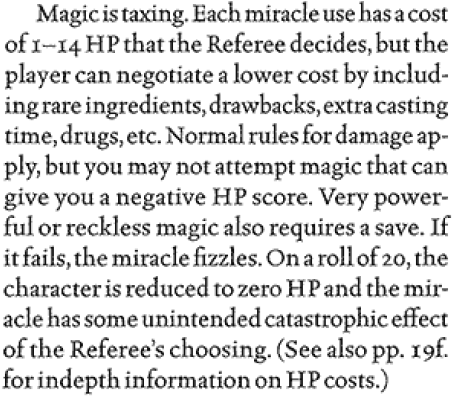In most Sword & Sorcery OSRs, Magic is thematically considered rare but powerful and terrifying.
But unfortunately this thematic direction/convention is rarely correlated with the game’s mechanics/rules.
Spells are still ordered by Levels with the amount of charges a magic-user can cast is effected by his/her XP Level. And when spells are being cast in front of others (regular humans/non magic-users),
it usually has no mechanical side-effects on them.
Here’s a list of optional rules and considerations i am currently tinkering with, in order to connect this thematic approach more tightly with the system itself.
Spell Casting:
► Casting a spell costs HP equal to its level - A level 2 spell costs 2 HPs.
► When a spell is cast, all non-magic users who experience the casting roll a Wisdom check.
► Failing gives Sanity Points equal to the spell’s level - A level 2 spell afflicts 2 Sanity Points.
► Magic-Users can cast from spell levels that are equal and below their overall spell charges.
For example: A level 3 Magic-User can cast a single level 3 spell or three level 1 spells.
► Healing spells cost HP, but when cast on self they have an increased effect.
► Casting a spell in public can cause horrific public results such as Mob lynching etc.
► Casting a spell discreetly, requires a successful DEX check.
► All Magic-Users cannot wear armor that reduces DEX in any way.
Sanity Points :
► The maximum amount of Sanity Points a PC can accumulate equals his/her Wisdom stat.
► Sanity can be restored with a short/long rest - Or praying to your Gods (Once per session).
► Once the accumulated Sanity Points exceed a PC’s Wisdom stat, the Trauma table is rolled.
► Once rolling in the Trauma table the current amount of Sanity Points is zeroed.
Trauma:
► Trauma is afflicted once a character’s accumulated Sanity Points exceeds its Wisdom stat.
► Once Trauma is afflicted the player will roll on the Trauma table.
► The Trauma table can give PCs a temporary and/or a permanent effect.
► Each Trauma effect will relate to either a stat element or a thematic personality element.
► Some results on the table will refer/tell the player to roll on the Madness table.
► Traumas can be cured only by a Ritual done by a Shaman/Cleric.
► A Shaman/Cleric cannot perform the ritual on him/her selves.
► A Ritual will work only if the PC shares the same religion as the Shaman/Cleric that performs it.
Would love to get your feedback on this.
Thanks in advance 



